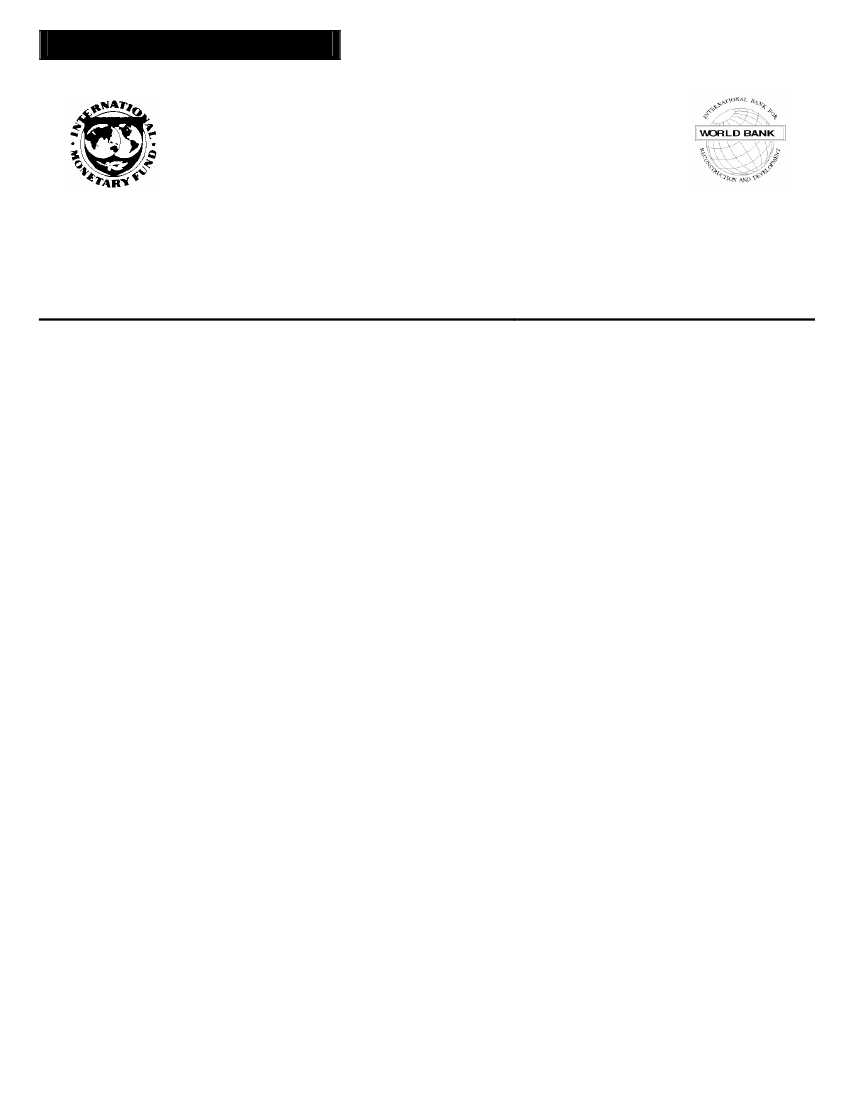Udenrigsudvalget 2009-10
URU Alm.del
Offentligt
FOR IMMEDIATE RELEASE
DEVELOPMENT COMMITTEEJOINT MINISTERIAL COMMITTEEOF THEBOARDS OF GOVERNORS OF THE BANK AND THE FUNDON THETRANSFER OF REAL RESOURCES TO DEVELOPING COUNTRIES1818 H Street, N.W., Washington, D.C. 20433Telephone:Fax:(202) 458-2980(202) 522-1618
Istanbul, Turkey, October 5, 2009DEVELOPMENT COMMITTEE COMMUNIQUÉ
1. The Development Committee met today, October 5, in Istanbul. We wish to convey our sympathy to the peopleof Asia and the Pacific affected by the recent natural disasters, and the Bank stands ready to assist them.2. The global economy has shown signs of recovery, but risks remain. In many developing countries, the impacton poverty and on the most vulnerable people is rising. As a result of the crisis, by end-2010, some 90 millionmore people risk being forced into extreme poverty. Hard-earned progress towards the Millennium DevelopmentGoals is in danger of being reversed. To protect the poor, we urged members to follow through on commitments toincrease aid and its effectiveness. Developing countries play an important role in the global recovery and theirprogress will be essential for future growth. We welcomed continued progress by developing countries to improvetheir policy frameworks, and recognized that addressing financing constraints and investing in developingcountries is critical for sustainable growth. We also acknowledged that the revival of world trade and investmentwill drive growth and urged members to avoid protectionist measures.3. We welcomed the vigorous response by the World Bank Group (WBG) to the crisis, noting that IBRD’scommitments almost tripled to $33 billion this year, and IDA’s reached an historic level of $14 billion. IFCcombined strong innovation with effective resource mobilization, providing $10.5 billion in investments from itsown account, and mobilizing an additional $4 billion through new initiatives in global trade, infrastructure,microfinance, and bank capitalization. We stressed the importance of incorporating appropriate lessons from thecrisis into the WBG’s future work. We support the WBG’s efforts to tackle long term development challenges inline with its comparative advantage, including investing in infrastructure development, support for private sector-led growth and employment, climate change, food security, fragile states, and governance reform, including theStolen Assets Recovery initiative. We welcomed the ongoing work on a post-crisis strategy for the WBG and lookforward to reviewing it at our next meeting. We called on the WBG to work with the regional development banksto assess their respective roles and methods of collaboration.4. We welcomed the timely and effective efforts of the IMF. Member countries are delivering on promises totriple the IMF’s resources. We welcomed the new SDR allocation, the more-than-doubling of the IMF’s medium-term concessional lending capacity to $17 billion, the reform of IMF facilities for low-income countries (LICs),and streamlining of IMF structural conditionality. We supported the joint efforts by the Fund and the Bank toincrease the flexibility of the Debt Sustainability Framework and the Financial Sector Assessment Program.
5. We encouraged the WBG to make full use of its existing resources, and are pleased the WBG is on track toprovide over $100 billion in IBRD financing over three years. We welcomed the progress in examining measuresto improve the WBG’s financial capacity and sustainability. We committed to ensure that the WBG has sufficientresources to meet future development challenges, and asked for an updated review, including on the WBG’sgeneral capital increase needs, to be completed by Spring 2010 for decision. The review should also address allpossible contingent approaches as well as keep in mind the infusion of capital that would come from a specialcapital increase for voice reform. In considering the potential general capital increase needs of the IFC, the reviewshould also examine the use of hybrid capital.6. Core spending on health, education, social safety nets, infrastructure, and agriculture in LICs needs to beprotected, while maintaining debt sustainability. In these circumstances, we committed to ensure that IDA has theconcessional resources it needs. We committed to explore the benefits of a new crisis response mechanism in IDAto protect LICs from crises, to be considered as part of the IDA 15 Mid-term Review. We called on the Bank todevelop a multilateral trust fund to support the Food Security Initiative for LICs in coordination with other relevantmultilateral institutions and initiatives. We also asked the WBG to review further ways to make more resources,including IBRD enclave lending, available to LICs.7. We committed to pursue governance and operational effectiveness reform in conjunction with voting reform toensure that the World Bank is relevant, effective, and legitimate. We stressed the importance of moving towardsequitable voting power in the World Bank over time through the adoption of a dynamic formula which primarilyreflects countries’ evolving economic weight and the World Bank’s development mission, and that generates in thenext shareholding review a significant increase of at least 3% of voting power for developing and transitioncountries, in addition to the 1.46% increase under the first phase of this important adjustment, to the benefit ofunder-represented countries. While recognizing that over-represented countries will make a contribution, it will beimportant to protect the voting power of the smallest poor countries. We recommitted to reaching agreement by the2010 Spring Meetings.8. Continuing improvements in the corporate governance, accountability and operational effectiveness of theWBG are essential for confronting the development challenges of the 21stcentury. We welcomed progress to dateand asked for a report for our next meeting on progress and proposals for advancing these reforms.9. The Committee expressed its appreciation to the Government of the Republic of Turkey for hosting the AnnualMeetings. It thanked Mr. Agustin Carstens, Secretary of Finance of Mexico, for his valuable leadership andguidance as Chairman of the Committee during the past three years, and welcomed his successor, Mr. Ahmed binMohammed Al Khalifa, Minister of Finance of Bahrain.10. The Committee’s next meeting is scheduled for April 25, 2010 in Washington, DC.
2


